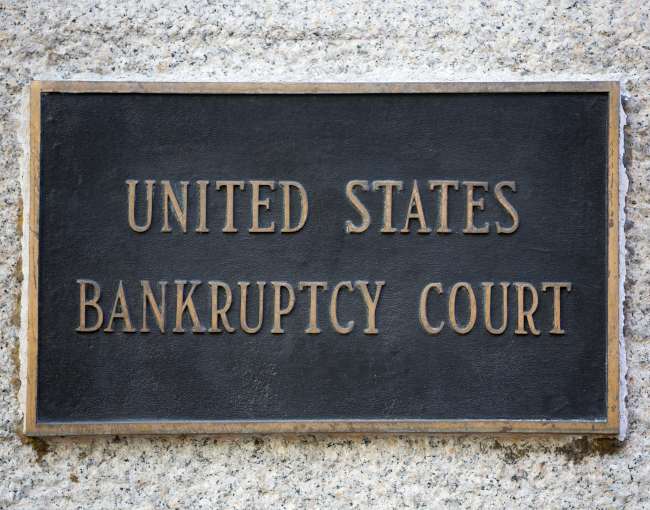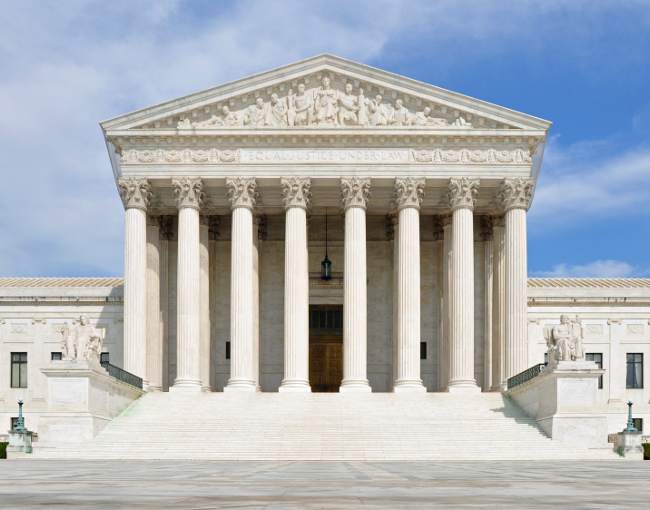
(By accessing, browsing or using the pages below, you agree to the Blog Conditions of Use/Disclaimer available under "Links.")
Posts
Are Subchapter V Corporate Debtors Subject to the §523(a) Exceptions to Discharge?

Congress passed The Small Business Reorganization Act of 2019 (the “SBRA”) for small businesses, currently defined as debtors with less than $7.5 million in debt. SBRA created a new Subchapter V, which can be used by both individual debtors or business entities, such as corporations, limited liability companies or partnerships (hereinafter “Business Entities”). READ MORE
Supreme Court rules section 363(m) limitations on bankruptcy sale appeals not jurisdictional

On April 19, 2023, the U.S. Supreme Court issued its opinion in MOAC Mall Holdings LLC v. Transform Holdco LLC, 598 U.S. (2023), reversing the Second Circuit decision and determining that the limitations on appeals of bankruptcy sale orders provided in section 363(m) of the Bankruptcy Code are not jurisdictional. Rather section 363(m) merely provides a "caveated constraint" on the appellant’s remedies on such appeals. READ MORE
Put down your fiddle: Third Circuit halts Johnson & Johnson’s Texas two-step

On January 30, 2023, the Third Circuit Court of Appeals dismissed the bankruptcy filing by Johnson & Johnson’s subsidiary, LTL Management, LLC (“LTL”). The Circuit Court reversed the New Jersey Bankruptcy Court and held that LTL did not file the bankruptcy case in good faith and therefore was ineligible to petition the bankruptcy court for relief. READ MORE
A recent decision highlighted a flaw in the Bankruptcy Code. Will the House of Representatives pass the Bankruptcy Threshold Adjustment and Technical Corrections Act to correct it?

On April 28, 2022, Central District of California Bankruptcy Judge Ernest M. Robles issued a decision regarding the eligibility of a debtor to proceed as a Small Business Debtor under Subchapter V of the Bankruptcy Code. READ MORE
Chapter 12 family farmer cases in Missouri: An updated look inside the numbers
.jpg?sfvrsn=c4724aea_2)
Agricultural economists have long warned of a looming farm crisis. However, for the most part, they have been wrong. In 2021, nationwide Chapter 12 family farmer bankruptcy filings were at second lowest level since Chapter 12 was enacted in 1987. The low level of Chapter 12 filings is all the more surprising given that Congress more than doubled the debt limit for Chapter 12 eligibility (to $10 million) in 2019. READ MORE
Fracas in the French Quarter: Fifth Circuit weighs in on ongoing controversy over the intersection of Bankruptcy Code Sections 363(f) and 365(h)

Reaching an outcome in line with two other circuit courts, on February 16, 2022 the Fifth Circuit Court of Appeals permitted a Chapter 11 trustee to sell a debtor’s real property free and clear of the leasehold estates held by certain non-debtor lessees. READ MORE
Johnson & Johnson: The Texas two-step and talc-related liabilities

A newly created subsidiary of Johnson & Johnson recently filed Chapter 11 to manage 38,000 pending talc-related lawsuits and future talc-related claims. There is nothing especially new about using Chapter 11 to deal with mass tort litigation. In the past three decades, thousands of companies, dozens of religious organizations, and even the Boy Scouts of America have filed Chapter 11 because of mass tort claims. READ MORE
Subchapter V in the Eighth Circuit: The data from the first 18 months

Congress originally conceived the new Subchapter V to “streamline the bankruptcy process by which small business debtors reorganize and rehabilitate their financial affairs.” The new Subchapter became effective on February 19, 2020, and the COVID-19 pandemic began in earnest less than a month later. The pandemic caused Congress to almost triple the Subchapter V debt limit from approximately $2.7 million to $7.5 million. However, the increased debt limit will expire in March 2022 if Congress does not act to extend it. READ MORE
Dude, your car is with your creditor: How the Supreme Court’s decision on automatic stays may impact creditors

The Supreme Court has held in City of Chicago v. Fulton that a creditor does not violate the automatic stay by merely retaining possession of the debtor’s property after a bankruptcy filing. Creditors will no longer have to immediately surrender property in their possession to the debtor to avoid liability for violating the automatic stay. READ MORE
Nine Bankruptcy Code amendments included in latest appropriations bill

On December 27, the Consolidated Appropriation Act was signed into law. In addition to funding the federal government in 2021 and providing COVID-related relief to individuals and businesses, the new law amends the Bankruptcy Code in at least nine respects. A brief description of the amendments is included in this article. READ MORE
Blog Browse: As COVID-19 prompts more retail tenant bankruptcies, how should landlords and lenders respond?

Businesses that were already struggling before the COVID-19 pandemic hit the United States are now facing the consequences of having to close their doors during the public health crisis. With more bankruptcies likely on the horizon as the economy reels from the pandemic, landlords and their lenders should consider both the basics and the nuances they face in preserving and protecting their collateral in the bankruptcy arena. READ MORE
Chicago Bankruptcy Court holds rent may be reduced during Chapter 11 proceedings due to COVID-19 shutdown orders

A Chicago bankruptcy court recently ruled in In re Hitz Restaurant Group that a debtor’s obligation to pay rent during its bankruptcy case may be temporarily reduced because of a force majeure clause in the lease and the governor’s COVID-19 stay-at-home order. READ MORE
Payday before mayday: The increasing use of pre-bankruptcy executive retention bonuses

The initial wave of post-COVID Chapter 11 business bankruptcies has revealed an increasing tendency for senior executives of financially distressed companies to award themselves substantial bonuses compensation immediately before placing their companies into bankruptcy. If this trend continues, it may largely nullify the efforts of Congress and the courts to rein in and strictly regulate such actions. READ MORE
Why the return of NOL carry backs may be good news for some distressed corporations

The CARES Act restores the ability of corporations to carry back net operating losses generated in taxable years beginning in 2018, 2019 or 2020 for up to five years, and removes the limitation on the amount of NOLs that can be carried forward to taxable years beginning in 2018, 2019 and 2020. Therefore, a corporation with NOLs can carry back and carry forward NOLs to reduce taxable income and generate a refund of some or all of the previously paid U.S. federal income taxes. READ MORE
Financial distress of the COVID-19 pandemic on not-for-profits

Charitable institutions and not-for-profit entities are particularly vulnerable to financial distress because of the COVID-19 pandemic. NFPs should not just focus on surviving the short-term, but they should also consider longer-term subsistence and resource-allocation issues. This is especially important for NFPs that struggled financially before the on-set of the pandemic. READ MORE
CARES Act expands eligibility under Small Business Reorganization Act of 2019

Congress just made it easier and less expensive for small businesses to reorganize under Chapter 11. Small businesses continue to struggle under the current social isolation measures in place in most states. Even with the recent financial relief package passed by Congress, many small businesses will not have sufficient resources to meet their most basic obligations such as rent, utilities and other operational necessities. In an effort to keep small business afloat during this crisis, Congress expanded small business bankruptcy relief in the Coronavirus Aid, Relief and Economic Security Act (CARES Act). READ MORE
Can government actions restrict creditors’ remedies during the COVID-19 emergency?

As the economic fallout associated with the COVID-19 virus continues, many cities and states have already suspended a landlord’s ability to evict delinquent tenants. These actions, coupled with similar directives on evictions and perhaps foreclosures that will be implemented in the coming days, are currently allowed under U.S. Supreme Court precedent. READ MORE
FAQs: Anti-net short provisions and what they mean for credit agreements

Parties to syndicated credit agreements and high-yield bond indentures have recently introduced provisions to limit the effect of those transactions on lenders that hold overall net short positions with the borrower or its debt. This article summarizes the key parties and terms related to anti-net short provisions, also known as Windstream Provisions. READ MORE
Appeals Court rules bankruptcy trustee can recover tuition payments from college

The First Circuit Court of Appeals has ruled that bankruptcy trustees may sue colleges and universities to recover pre-bankruptcy tuition payments received from parents of adult children. The decision, while not binding in any other court of appeals, signals a clear trend in similar cases. READ MORE
Health care provider agreements may be acquired 'free and clear' in bankruptcies

Breaking from the overwhelming majority of prior case law, two bankruptcy courts recently held that Medicare and Medicaid provider agreements can be assigned as part of a Section 363 bankruptcy sale free and clear of the assignor’s liabilities under the provider agreements, including amounts due or that may become due under the Provider Agreement for pre-assignment activities. READ MORE
Four key takeaways from the August 2019 bankruptcy code amendments

The President has signed legislation modifying the Bankruptcy Code in several respects. The changes are meant to help preference recipients, family farmers, disabled veterans, and small businesses. READ MORE
Possession is not ‘nine tenths of the law’: Impounded vehicles must be returned when a bankruptcy petition is filed

In a recent opinion, the Seventh Circuit ruled the City of Chicago must return repossessed and impounded vehicles upon receiving a bankruptcy petition, or run the risk of violating the automatic stay under Section 362 of the Bankruptcy Code. The decision helps answer whether the City could continue to hold onto a debtor’s vehicle post-bankruptcy filing when the vehicle was repossessed and impounded pre-bankruptcy. READ MORE
SCOTUS rules post-discharge collection actions may result in civil contempt

The U.S. Supreme Court’s holding in Taggart should remind creditors to closely examine a discharge before taking any actions to collect an obligation that might have been discharged in a bankruptcy case. READ MORE
Supreme Court decides key trademark licensee issue in bankruptcy

On May 20, 2019, the U.S. Supreme Court ruled a trademark licensee can continue to use the trademark after a bankrupt licensor rejects the license agreement. The ruling removes the risk that a licensor could file bankruptcy and terminate the licensee’s rights to use the trademark. READ MORE
Bitcoin and cryptocurrency negotiability is an uncertain landscape

Under the current laws of most states, purchasers of Bitcoin and other cryptocurrencies are at risk of having to disgorge their holdings if an adverse claim is asserted by a creditor of a prior owner of the cryptocurrency. However, rather than adopting uniform laws, the latest solutions are very different and may lead to an even more complicated landscape. READ MORE
Court allows secured creditor to retain mortgage lien after mistaken release and reinstatement prior to bankruptcy

If a secured creditor mistakenly releases its lien, it should correct the error as soon as possible. A recent decision from the U.S. Court of Appeals for the Seventh Circuit implies if the secured creditor is diligent, it may not be harmed by the inadvertent release, even if the borrower files for bankruptcy. READ MORE
It may be foul, but there is no harm: Not all mistakes have dire consequences under UCC Article 9

While it is important to prepare financing statements clearly and correctly, the policy governing financing statement collateral descriptions under the UCC is meant to be flexible and fundamentally fair. In re 8760 Service Group demonstrates some careless errors can be overcome. READ MORE
In Gouletas, bankruptcy court rules statutes of limitations have limitations

In a recent Chicago bankruptcy case, the judge ruled that obligations are not extinguished by statutes of limitation and, even after the expiration of the limitation period, a creditor retains its rights in collateral so long as the underlying debt is enforceable. READ MORE
Court rules subordination agreement bars junior creditor from obtaining discovery from senior creditor

A recent decision from the U.S. Bankruptcy Court strictly enforced a subordination agreement preventing the junior lienholder from obtaining discovery from the senior creditor. This is good news for creditors who bargain for “silent second” language in subordination agreements. READ MORE
The Federal Priority Act: How ‘secure’ is a secured creditor if the debtor is subject to a federal claim or investigation?

Under the Federal Priority Act, the government gets paid first if it has an outstanding claim when businesses or individuals become insolvent. But a review of relevant case law suggests that creditors who hold a prior perfected interest in a debtor’s real or personal property may still have a fighting chance in an ensuing priority battle. READ MORE
Delaware bankruptcy litigants get lost in Article 9’s anti-assignment override provisions

A recent Delaware bankruptcy court decision may leave bankruptcy-claim traders somewhat confused as to how to properly navigate the anti-assignment “override provisions” set forth in Revised Article 9 of the Uniform Commercial Code. READ MORE
Assignee’s pre- and post-petition attorney fees are compensable in a Chapter 7 bankruptcy

In a recent Chapter 11 case (and subsequent Chapter 7 case), an Illinois Northern District judge ruled that an assignee in an ABC could collect pre-petition and post-petition attorney fees and expenses. READ MORE
Consumer lenders should review key borrower notices in light of recent Missouri decisions

Missouri statutes, like statutes in many other states, govern right-to-cure, pre-sale, and post-sale notices that lenders in secured consumer transactions send to borrowers when the borrowers default and the lenders seek to repossess and sell their collateral. Consumer lenders should be aware of two recent decisions from the Missouri Court of Appeals. READ MORE
Three key changes for bankruptcy procedures in 2018

The New Year brings with it new changes to the bankruptcy code. These recent rule changes apply to any case filed after December 1, 2017, and may apply retroactively to pending proceedings in those instances where it would be “just and practicable.” READ MORE
Appellate court upholds creditors’ ability to charge interest on written off accounts

The court ruled that a creditor’s charge off of an account, standing alone, does not mean that the creditor has agreed to waive the right to assess additional interest otherwise permitted by the credit agreement. READ MORE
Caveat creditor: Risks of filing an involuntary bankruptcy

Creditors considering filing or joining in the filing of an involuntary bankruptcy petition, and the attorneys that represent them, have much to deliberate before becoming involved in an involuntary bankruptcy filing. READ MORE
Managers of insolvent Missouri LLCs have no fiduciary duty to creditors

Two recent federal court decisions establish that managers of financially troubled Missouri limited liability companies do not owe a fiduciary duty to creditors of their troubled enterprises. READ MORE
Two non-conventional uses for Missouri’s new receivership statute

The new Missouri Commercial Receivership Act provides a much more robust receivership remedy than prior law, giving creative counsel tools to achieve some results that were not necessarily possible under the old law. READ MORE
Valuation of affordable housing projects in bankruptcy – a muddied landscape

A divided panel of the 9th Circuit Court of Appeals recently held that rent restrictions should not be considered when valuing a secured creditor’s interest in an affordable housing project that the debtor proposes to retain under a plan of reorganization. READ MORE
Supreme Court’s discharge exception ruling gives creditors more options

In Husky Int'l Elecs., Inc. v. Ritz, the U.S. Supreme Court recently determined that the nondischargeability of debts under 11 U.S.C. § 523(a)(2)(A), which prohibits discharge of debts “obtained by . . . false pretenses, a false representation, or actual fraud,” does not require a false representation. The “actual fraud” exception to a bankruptcy discharge includes other traditional forms of fraud, including fraudulent conveyances that do not necessarily include a representation by the debtor or reliance by the creditor. READ MORE
7 things you should know about the new Missouri Commercial Receivership Act

On May 10, 2016, the Missouri General Assembly passed the Missouri Commercial Receivership Act (MCRA), providing for significant changes to Missouri’s law on receiverships. Assuming that Governor Nixon signs the bill (which is almost certain), the law will become effective later this year. The significant changes to the Missouri receivership law in the MCRA are as follows, READ MORE
U.S. Supreme Court unable to decide whether ECOA protects spousal guarantors

The United States Supreme Court was poised to finally resolve this issue, but the death of Justice Antonin Scalia prevented the Court from doing so. On March 22, 2016, the Supreme Court was divided 4-4 in a case where the lower appellate court had ruled that spousal guarantors are not protected by the ECOA. READ MORE
The government gets paid first: The surprising reach of the Federal Priority Act

No matter your industry or line of business, insolvency is not a pleasant process. But it may surprise even a seasoned corporate attorney when one debtor in particular comes calling: The federal government. The law that makes it possible — and pushes Uncle Sam to the front of the creditor line — is the Federal Priority Act. READ MORE
Deprizio waivers in bankruptcy cases: Valid, or a sham?

The Ninth Circuit Court of Appeals in In Re Adamson Apparel, Inc. became the first appellate court to address the validity of “Deprizio waivers." In Adamson, the court held that because the Deprizio waiver was not a “sham” provision, the insider was not a creditor of the debtor that could be subject to a preference action. The decision carved out a fact-based avenue for analysis that will likely lead to increased litigation across the country on the issue of Deprizio waivers. READ MORE
Reinstatement of a LIHTC LURA following foreclosure

Often the lender would like to preserve the property as a LIHTC property and take advantage of the value of any remaining tax credits. The lender usually accomplishes this result by either reinstating the existing LURA following the foreclosure sale or encumbering the property with a new LURA. READ MORE
LIHTC exit strategies: Foreclosure

A lender’s ultimate remedy for dealing with a distressed and over-leveraged LIHTC project is to foreclose on the project. Foreclosure is the primary unilateral remedy that may be undertaken by a lender and will generally be the remedy against which a negotiated restructuring will be measured and evaluated. READ MORE
LIHTC exit strategies: Right-sizing the loan

The most logical long-term solution for a distressed and over-leveraged LIHTC project is a negotiated re-structuring or “right-sizing” of the debt owed to the lender. Such a right-sizing may be accomplished by a repayment of debt by the borrower and investors, a forgiveness of debt by the lender or a combination of both. While in theory this is the most logical solution, just like any settlement, it depends upon the parties’ positions. READ MORE
LIHTC exit strategies: Loan sale

Because there is currently a very robust market for distressed debt, a lender's first option for dealing with any non-performing loan is often to look to sell the loan. This post addresses the unique considerations and difficulties involved in the sale of a loan secured by an LIHTC project. READ MORE
Eight things we learned from the Detroit bankruptcy

At the beginning of the case, no one predicted that the city would emerge from bankruptcy so quickly — only about 18 months — or that the final Plan of Adjustment would enjoy such widespread support among creditors and politicians. What can we learn from the largest municipal bankruptcy ever? READ MORE
Getting the house in order: The early stages of a LIHTC workout

While these ultimate outcomes are the same as those involving workouts of market-rate properties, there are unique issues that must be addressed and analysis that must be undertaken in determining which outcome is the most appropriate in a LIHTC workout. In this post, we will explore how a lender should use the early stages of a workout to better its position, analyze its alternatives and select the best workout or exit strategy. READ MORE
Debtor-trustees can run but they can’t hide behind the Fifth Amendment

Judgment debtors often try to use the Fifth Amendment’s privilege against self-incrimination to avoid post-judgment discovery of their assets and income. However, the U.S. District Court for the Eastern District of Missouri ruled last year that when the judgment debtor is a trust, neither the trust nor its individual trustees may invoke the privilege against self-incrimination, and the trust must comply with post-judgment discovery. The decision is important for banks and other creditors because individuals often hold their assets in trusts. READ MORE
The valuation process for LIHTC projects in financial distress: Part II

Today, we’ll dive deeper into how an appraiser might approach a valuation, and some concerns that courts have raised about the valuation process for these types of redevelopment projects. What does a typical LIHTC appraisal look like? A comprehensive LIHTC appraisal covers four separate valuation scenarios. READ MORE
The valuation process for LIHTC projects in financial distress: Part I

In any workout or bankruptcy, it is important to understand the value of a lender’s collateral, because the value of the collateral will largely determine the amount of the lender’s recovery. This is particularly true in a workout or bankruptcy involving an LIHTC project because under the federal LIHTC program, once a project is placed into service, all senior debt of the project owner must be non-recourse to the partnership and its partners. READ MORE
What are the unique dynamics of a low-income housing tax credit workout?

In the still-developing area of low-income housing tax credit workouts and bankruptcies, secured lenders may feel relatively powerless. But armed with knowledge concerning several key leverage points, a lender can better protect its interests and negotiate an advantageous outcome of a troubled loan. READ MORE
Low-income housing tax credit workouts and bankruptcies: Understanding the basics

This post is the first in a continuing series on the Credit Report Blog on the subject of workouts and bankruptcies involving low-income housing tax credit (LIHTC) projects. Our upcoming blog posts will discuss specific issues unique to LIHTC project workouts and bankruptcies. READ MORE
Sixth Circuit rules cows can be leased

Can you really lease a cow? According to the Sixth Circuit, the answer is “yes.” In fact, the legal and practical issues of cattle leasing were clearly illustrated in a recent decision from the Sixth Circuit, Sunshine Heifers, LLC vs. Citizens First Bank (In re Purdy). READ MORE
U.S. Supreme Court’s decision in Clark won’t impact inherited IRAs of Missouri residents

A debtor may shield from collection by creditors assets that the debtor holds in Individual Retirement Account (IRA). However, as more IRA owners die with substantial assets remaining in their accounts, a new question has arisen: Can a debtor exempt an IRA that she inherited from someone other than her spouse? READ MORE
New value defense preserved for three-party transactions

New value is an important defense to preference liability under the Bankruptcy Code. In a very important decision, the Eighth Circuit recently addressed how the new value defense to preference liability should be applied in three-party payment arrangement. READ MORE
Fisker bankruptcy update: Should secured creditors really be concerned?

The opinion by the Delaware bankruptcy court in In re Fisker Auto. Holdings, Inc., raised alarm bells for secured creditors throughout the country. Many worry that it will diminish the valuable right of secured creditors to credit bid, READ MORE
Mortgage buyer’s thin paper trail sufficient to avoid summary judgment in borrowers’ favor

Disastrous results can befall a financial institution that buys a mortgage loan but does not obtain or keep adequate documentation related to the purchase. Yet over the past several years, many mortgages have exchanged hands with little-to-no supporting documentation. As recent cases have shown, deficient documentation has often caused headaches for financial institutions when they try to foreclose. READ MORE
Missouri court rules jury waiver applies here, there, and everywhere

What happens when one loan document contains a jury waiver but another doesn’t? For the lender, all may not be lost. That was another important holding from the Missouri Court of Appeals Western District in Midland Property Partners, LLC v. Richard Watkins. READ MORE
Want to recover attorneys’ fees in Missouri? Make sure you use the magic words

It has been the longstanding rule in Missouri that a litigant may recover his attorneys’ fees and costs from the losing party if the underlying contract expressly authorizes the award of attorneys’ fees. But Missouri courts take very seriously the requirement that attorneys’ fees be expressly authorized. READ MORE
Lien for jointly-owned property may be invalid if only one spouse signs deed of trust

Occasionally mortgage lenders require only one spouse to sign a deed of trust (or mortgage) and allow the other spouse to sign a separate document consenting to the loan transaction. But, as a Missouri appellate court ruled recently, this practice could leave the lender with an invalid lien if both spouses own the property. READ MORE
Receivership reforms, part four: Borrowing from the Bankruptcy Code

Bankruptcy cases frequently take too long and are too expensive, thereby delaying and reducing recoveries to creditors. By borrowing the best parts of the Bankruptcy Code and avoiding some of its more litigious parts, a new receivership statute will, in certain types of cases, permit a more efficient redeployment of distressed corporate assets to productive uses. READ MORE
Receivership reforms, part three: Creditors’ rights and priority of claims

A receivership can affect the rights of many others who are not parties to the litigation, such as employees, creditors, and business partners. Although some old cases, recognize the ability of creditors to file claims against receiverships, there is no uniform procedure to account for the claims of creditors and otherwise protect the rights of non-parties. READ MORE
Receivership reforms, part two: Establishing and empowering receivers

Many modern statutes recognize two basic types of receiverships. The first, called a “limited” or “custodial” receivership is one where the receiver is appointed to hold specific identified property pending a more complete resolution of the respective parties’ rights in the property. The second, called a “general” receivership, involves all assets of the entity with the stated purpose of selling or liquidating the entity. READ MORE
Why Missouri’s receivership law is due for reform

Missouri receivership law, however, is largely unchanged from the 19th Century and is simply inadequate in several respects to address all the issues raised by the liquidation of a modern business. A few states around the country have recently updated their own receivership laws, and Missouri should follow suit. READ MORE
New Missouri law bans local efforts to mandate foreclosure mediation

As a result of recent legislation, local Missouri governments are precluded from establishing procedures for servicing or enforcing mortgage loans that contradict state or federal laws governing these matters. READ MORE
New credit agreement language goes into effect in Missouri on August 28

Lenders dealing with Missouri borrowers should be aware of a small, but very important, change in Missouri law regarding credit agreements that becomes effective on August 28, 2013. READ MORE
Consider litigating spousal guaranties in federal court to avoid the Equal Credit Opportunity Act

If the Equal Credit Opportunity Act is violated, the spousal guaranty may be void or, even worse, the financial institution may face liability. In Missouri and Illinois, whether the ECOA applies to a spousal guaranty depends on whether the financial institution attempts to enforce the spousal guaranty in federal or state court. READ MORE
Keep rejected loan applicants in the loop or face possible punitive damages

If a bank has approved a loan application but later changes its mind, it should promptly advise the loan applicant; otherwise, the bank may face liability for punitive damages. This was the lesson in Bailey v. Hawthorn Bank before the Missouri Court of Appeals Western District. READ MORE
Ownership of Chapter 11 debtors can’t be retained without competition and credit bidding

Owners of Chapter 11 bankruptcy debtors have long devised schemes to try to hold on to their ownership interests while stiffing the debtors’ creditors. In the past, owners attempted to do this by proposing reorganization plans that paid creditors only a portion of what they are owed while selling all of the equity in the reorganized debtor to the owner for a nominal new investment. READ MORE
Internal bank documents can satisfy written credit agreement requirement of Missouri Credit Agreement Act

In a recent case, the Missouri Court of Appeals ruled that the Missouri Credit Agreement Act’s requirements can be satisfied by internal bank documents that indicate that the bank has agreed to make a loan even if the documents are never shared with the loan applicant. READ MORE





